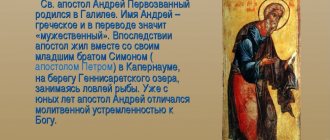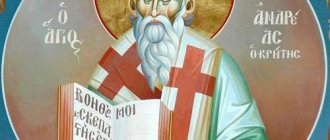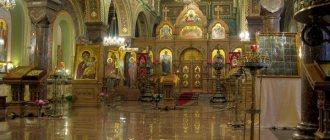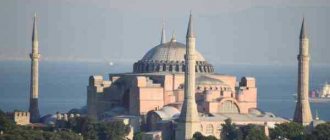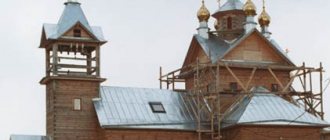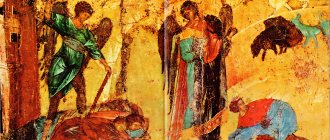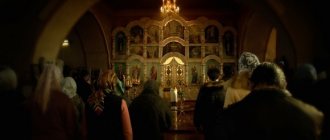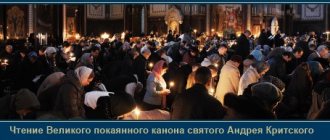Desnitsky Andrey Sergeevich.
Desnitsky Andrey Sergeevich (1968) – publicist of the modernist movement, representative of the so-called. “Biblical criticism”, follower of Fr. Vladimir Lapshin.
In 1992 he graduated from the Faculty of Philology of Moscow State University (classical philology). From October 1992 to July 1993, he studied in the one-year course “Biblical Translation” at the Free University of Amsterdam (Vrije Universiteit). In 1997 he defended his thesis “Translation technique of the Septuagint in the context of the evolution of Hellenistic poetics (analysis of songs and blessings of the Pentateuch).”
Employee of the Institute of Oriental Studies of the Russian Academy of Sciences.
Consultant of the Russian branch of the Swedish ecumenical missionary organization “Bible Translation Institute” (since 1999). He spoke on the Catholic radio “Sofia” (directed by Father John Sviridov), where he hosted the programs “Living Word”, “Messengers of the Kingdom”, “Manuscript”. He appeared on the religious program of the BBC Russian service “Faith and Age” (hosted by Faina Yanova).
In 1998, after the Appeal of Patriarch Alexy II to the clergy and parish councils of churches in Moscow at the Diocesan Assembly on December 16, 1997, A.D. spoke in defense of Fr. V. Lapshina and Fr. G. Kochetkov and their right to publicly preach modernist ideas.
The Patriarch, in particular, stated:
Priest Vladimir Lapshin agreed that there was repentance beyond the grave, but, on the contrary, there was no Entry into the Temple of the Most Holy Theotokos. His statement about the founder of Islam indicates complete theological illiteracy. Defending G.P. Yakunin and declaring his love for the defender of totalitarian sects, priest Vladimir Lapshin reproaches the Hierarchy for revenge, saying that they returned evil for evil. But is it evil to defrock an opponent of the Church? By telling his listeners lies about Patriarch Hermogenes, about monasticism, about the Lord Jesus Christ, Who is supposedly present in other religions, the unfortunate shepherd Vladimir Lapshin himself brings evil instead of good. Before the demonstration of the blasphemous film “The Last Temptation of Christ,” when the Hierarchy and the Orthodox people sharply condemned this step, the same priest Vladimir Lapshin called for watching the film, citing the fact that one cannot condemn what one has not seen, that is, sin can be condemned only after he has done it.
HELL. claims that these words of Fr. Lapshin are “taken out of context,” and if you write down every word of a person, take individual phrases out of context and interpret them accordingly, you can accuse anyone of heresy. HELL. objects to Patriarch Alexy: I believe that Fr. Vladimir, as well as some other so-called. “modernists” are looking for forms of church life that are fully consistent with the Orthodox faith and, at the same time, adequate to our time and our country.
For some time A.D. was an employee of the Russian Bible Society (president - Fr. A. Borisov).
Works by A.D. published by the modernist Kyiv publishing house Quo vadis (chief editor: Father Andrey Dudchenko). Author of the “Kievan Rus” website, edited by Fr. A. Dudchenko.
HELL. is one of the authors of the almanac “Christianos”, published by the International Charitable Foundation. Alexandra Menya” (Riga).
Participant in the annual Bible readings in memory of Fr. Alexandra Menya, which are conducted by a certain “Heritage College of Biblical Training for Ministries”, “Society of Friends of the Holy Scriptures” and the Library of Foreign Literature (VGBIL).
In 1999, 2000, 2002 and 2003. took part in the “St. Andrew’s Readings”, organized by a large modernist educational institution: the Biblical and Theological Institute (BBI). He gave lectures at the “Kiev Summer Theological Institute”, i.e. in the summer lecture hall of the BBI. Articles by A.D. regularly published in the BBI magazine “Pages”.
Lecturer at the “School of Youth Ministry” of the Center for the Spiritual Development of Children and Youth (Director of the Center - Fr. Petr Meshcherinov).
Regular author of the magazine “Foma” (editor-in-chief V.R. Legoyda), the online newspaper “Tatyana’s Day”.
Prose
Three stories
...about Christianity, you can download them on a separate website. This, I believe, is the best and most important thing I have written.
Notes of Balabol
pdf • epub • mobi • fb2
Continue the brilliant “Letters of a Screwtape” by K.S. Lewis - no small audacity. But I really wanted to transfer their action to modern Russia...
Letters to a Sleeping Brother
pdf • epub • mobi • fb2
When “The Balabol Notes” came out, I began to receive requests to describe the same story from a different perspective. But I did not dare to speak on behalf of the guardian angel. Let man speak about man.
Here from afar
pdf • epub • mobi • fb2
The collection includes ten stories about the lives of our contemporaries. What is it like to return to a city by the sea where you were happy in your youth, or to meet in a subway car a person whom you last saw on the front line. It is also a reflection on what happened and what could happen in Russian history of the twentieth century.
Russian Amsterdam
pdf • epub • mobi • fb2
This is not an autobiography, but almost every episode in this story was taken from real life in Russian Amsterdam in the early 1990s. I myself was part of it then.
Ugarit
(co-authored with Tatiana Fedorova)
pdf • epub • mobi • fb2
A true story about the dangerous journeys of the great mistress Yuliatu from Belyaev and the mighty warrior Ben-Yamin from Sokolniki. Tatyana Fedorova and I came up with a story about our contemporaries who found themselves in the world of antiquity, where there were gods, heroes and pirates, but in general everything was like ours.
Family
As soon as Andrei turned 18, he married Asa Stein, a future philologist and the mother of his three children.
Family of Andrei Desnitsky
The first daughter Anna was born a year after the wedding (1987), when her dad served in the army. Now Anna illustrates books after graduating from the University of Printing Arts.
In 1991, the Lord gave the loving couple another daughter, Daria, who chose an artistic career after graduating from the Shchepkinsky Theater School.
1999 gave the family an heir, Sergei, named after his grandfather, with whom Andrei maintained a warm relationship, despite his father’s second marriage.
In 2012, the 44-year-old scientist became a grandfather for the first time; his children gave him three grandchildren to date. The family atmosphere in the house is filled with warmth, which is enhanced by imposing cats, everyone’s favorites.
Poetry
to your yard
pdf • epub • mobi • fb2
A collection of poems from different years. What else can I say about poetry?
Voices of Byzantium
pdf • epub • mobi • fb2
Byzantium was a long time ago and not at all what we used to think. What if they spoke to us - real, alive? I tried to imagine it...
What Patriarch Kirill spoke about
Actually, “Biblical scholar Desnitsky” is an Internet meme. Or, as they called it in the old days, a common noun. But at the same time, of course, he is quite a lively and even hyperactive character, especially when it comes to the Russian Church. It's just hard to read. For you, perhaps, only because he writes “darkly and sluggishly,” like some completely unbiblical Lensky. But in my case, additionally because the biblical scholar Desnitsky tightly blocked my access to his Facebook page.
This repressive act was the first and last time that the biblical scholar Desnitsky responded to my simple-minded criticism of his crafty and evasive anti-church opuses in the liberal press and on social networks. But, of course, it was at the same time his great polemical success - to figure out to use this most irrefutable argument of all possible in general and, in particular, available to him personally.
Since then, I have had to read the biblical scholar Desnitsky in various reprints on the pages of mutual acquaintances. No, don’t think anything like that - not because I’m such an extravagant lover of pathetic Russian writing performed by certified philologists. But simply so as not to fall out of the current context of Euro-Orthodox renovationist life. And also, I admit, out of pure laziness. So that, as they say, you don’t have to get up twice. Andrei Desnitsky wrote about something, it means that something similar was recently said or published somewhere by an open enemy of the Church, Stanislav Belkovsky .
And this means that a new reformist trend has already spread to the liberal masses. Well, this is how it was, for example, with the idea of the actual abolition of the current church-administrative hierarchical vertical, as well as with the dream of nurturing and institutionalizing intra-church opposition - through the proposal to transform the Russian Church into a confederation of autonomous club-type parishes-communities.
Naturally, exactly the same thing happened immediately after the recent keynote speech by His Holiness Patriarch Kirill at the opening of the exhibition-forum “Orthodox Russia. My history. From great upheavals to Great Victory." Naturally - in the sense that the entire anti-church rally, according to established custom, immediately began to habitually and voluptuously savor the “great upheavals” and spit away from the “great victories” of modern Russian history. And our biblical scholar, of course, did not disappoint here, finding himself in the vanguard of blasphemy and slander against the Church, which he even writes with a lowercase letter out of the fullness of sincere feelings.
But here’s what’s remarkable and what would be instructive to analyze as an exercise for future textual critics, whom the biblical scholar Desnitsky is teaching, I don’t know. The Patriarch, in his speech at the Manege, says: “We all know that the post-revolutionary time was a time of chaos, a clash of class, social, political, economic interests, attempts to destroy the country; a lot of blood was shed, millions were expelled from the borders of our Fatherland. We know that the 1930s were also difficult years - a lot of blood, a lot of injustice, and all this should never leave our memory, just as this suffering cannot be minimized.” However, Desnitsky simply ignores this fundamental thesis, “as if he had never done it,” and, not without some well-known publishing fraud, conceals it from his reader.
Then the Patriarch moves on to the antithesis: “But there would be no modern Russia if there had not been the feat of previous generations, who in the 20s and 30s did not just plow the land - although this is very important - but created industry, science, the defense power of the country." Here Desnitsky noticeably perks up, sensing profit for his slander. Although, it seems, he is still completely unaware of the existence of the old maxim that says that comparaison n'est pas raison (comparison is not an argument). And he annoyedly brushes aside the history of “this country” in favor of, apparently, biblical chronicles that are more intelligible to his feelings: “We can cite parallels about what great achievements we do not question in Herod the Great or Diocletian.”
Finally, the Patriarch formulates his understanding of the synthesis, his view of the historiosophy of our common twentieth century: “Where will, strength, intelligence, political determination were manifested, we say: “yes, undoubted successes,” as in the case of the victory in the Great Patriotic War. And where there was blood, injustice, suffering, we say that this is unacceptable for us, people of the 21st century. We hand over historical characters to God's judgment. But the negative aspects should never give the right to exclude all the positive things that have been done. As well as vice versa, the positive things that were done by certain people should not exclude a critical attitude towards the crimes that were committed by them. I really hope that the exhibition will help us understand the beauty of the feat of our people in the 20s, 30s, 40s. It will help us see the difficult pages and understand: in order to love the Fatherland, we do not need to exclude any period from historical memory, but we need to perceive them with common sense and an unclouded moral sense, and then truth will be separated from lies, and good from evil.” .
This is a very difficult place for the biblical scholar Desnitsky - well, it’s about “loving the Fatherland,” “with common sense” and “an unclouded moral sense.” You won't believe it, but he gets out of the situation brilliantly. Walking around, he said briefly, with the arrogance of a stranger characteristic of him: “All this will achieve nothing.” And he immediately moves on to his own conclusion about what he heard, not to mention the liberal-Bolshevik verdict that is not subject to appeal: “The ideal of the current church leadership is completely clear. This is the USSR... Instead of an atheistic ideology - an Orthodox statist ideology, instead of ideological departments - church structures.”
Where this can be seen, why exactly this is so, where this is, does not provide an answer. The main thing here, instead of explaining in connection with all these annoying questions, is to repeat more often that “the church is not equal to its top leadership, just as the country of Russia is not equal to the presidential administration.” True, here again he habitually stole one meaning and fraudulently replaced it with another - adding, hoping that they would not notice, the word “administration”.
Gregory the Theologian , clearly does not belong to the biblical scholar Desnitsky with his “Pharisee and Sadducee leaven ”: “Combining in himself the wisdom of the serpent in reasoning the dove’s evil and gentleness in reasoning about good, he did not allow prudence to become evil, or simplicity to reach the point of dementia, but from both perfections, as best as possible, he formed one virtue.”
Although, speaking frankly, I personally have no big complaints against the biblical scholar Desnitsky, who is always litigious with the Church. According to objective indications, as they say in medicine. Well, in the spiritual-intellectual space I met a man with a narrow sectarian consciousness, with a flawed political, egoistic and complex view of the Russian world, his complete antipode. Namely, an integral historical person, to whom all the filial times of his Fatherland, with their victories, defeats and dramas, with their hopes and despairs, with their God's permission and God's intercession, are equally clear and close to him. And the first person, naturally, did not recognize himself at all in the second. Well, what to do if it was not given to him due to his poverty. Let us consider it as an allowance and pray for his deliverance from the evil curse.
But he would not so tirelessly blaspheme the country of his depressing stay, would not condemn its long-suffering Church for the sins of ethnophyletism and servilism invented by him, would not try with all his might to grossly politicize its sacramental liturgical life, would not try to reduce its universality measurement to local.
As for the rest - well, dialectical thinking has not yet been artificially implanted into anyone’s head. Although, perhaps, thank God, because the Church itself would still be against such a transfiguration operation. Let the biblical scholar himself do the work if he still counts himself among the members of this Church.
Translations
See translations of the New Testament messages here.
Book of the Prophet Isaiah
pdf • epub • mobi • fb2
The author's version of the translation made for the Zaokskaya Bible, edited by M.P. Kulakova and M.M. Kulakova.
Book of Job
The translation was carried out within the framework of the Russian Bible Society project.
Book of the Prophet Ezekiel
pdf • epub • mobi • fb2
The author's version of the translation made for the Zaokskaya Bible, edited by M.P. Kulakova and M.M. Kulakova.
Book of Proverbs
(co-authored with E. Rashkovsky and E. Smagina)
The translation was carried out within the framework of the project of the Russian Bible Society
Books of the Twelve Prophets
pdf • epub • mobi • fb2
The author's version of the translation made for the Zaokskaya Bible, edited by M.P. Kulakova and M.M. Kulakova.
Scientific activity
Among the publications of Andrei Sergeevich Desnitsky, a special place is occupied by monographs that raise topical themes of Holy Scripture:
- a description of the life of Moses as a lawgiver;
- interpretation of the New Testament through the letters of the Apostle Paul;
- the path from tradition through scripture to modernity;
- study of the connection between Orthodox traditions and the Bible;
- familiarity with biblical exegesis;
- descriptions of biblical heroes and others.
Professor Desnitsky gives a lecture for clergy
In his articles, the biblical scholar touches on a wide variety of topics, from the Old Testament canon, Byzantine poetry to modern views on the system of Hebrew verb tenses.
Interesting! Scientific articles by Andrei Desnitsky are reference books for translators and interpreters of the Bible.
The scientist is open to discussions, accepts invitations to lectures, teaches and consults. On the Internet, especially on YouTube, you can see how many people attend the lectures of an outstanding publicist.
Readers interested in the history of Christianity pay special attention to the books of Andrei Sergeevich Desnitsky, which provide a study of the Old Testament. Many of his works have become bestsellers in Christian bookstores.
Journalism
Latest publications:
Religion in Russia - 2050
In our society, religiosity will not disappear, but it will clearly change (Bulletin of Europe)
Migrations in social networks
Should I leave Facebook for Telegram? (Gazeta.ru)
Book as property
What to do with the rights to e-books? (Gazeta.ru)
August thirty years later
How do you remember 1991 today? (Gazeta.ru)
Unexpectedly: Serbia!
A good idea for holidays and holidays (Gazeta.ru)
Publications by year: 2022, 2022, 2022, 2022, 2022, 2016, 2015.
Searching for meaning
OLYMPUS DIGITAL CAMERA
pdf • epub • mobi • fb2
The collection includes seventy journalistic articles published in 2010-2012 in various online publications. Themes range from faith to politics, but their general direction is reflected in the title: “in search of meaning.”
* * *
Some old publications can be found on the websites: Gazeta.ru, Elephant, Russian Journal, Orthodoxy and Peace, Tatiana's Day, Kievan Rus. Other sites (for example, “Moscow News” and “Neskuchny Sad”) did not save them.
short biography
Before graduating from the institute, Andrei’s life was not distinguished by any special outstanding events.
On August 21, 1968, the family of the Moscow dramatic actor S. Desnitsky was replenished with a son, who was born in Moscow. Andrei’s mother, Svetlana Stepanovna, worked as a teacher and passed on her love of philology to her son.
His birthday was not just a date, at that time the whole country lived in special tension, when Soviet troops entered Czechoslovakia to suppress the Velvet Revolution.
Kindergarten, secondary school No. 31, from which he graduated in 1985, studies at the philological faculty of Mikhail Lomonosov Moscow State University - these are the main stages of his life before knowing God.
The traditional path of children of that time, only the names of schools and universities changed.
In the late 90s there was no deferment from military service for students, so in 1987-1989 Andrei had to experience the taste of soldier’s life, but before that, young Desnitsky, in parallel with learning languages, met a sweet girl Asya, with whom he was baptized before marriage.
Studying abroad was just beginning to develop at that time; the Free University of Amsterdam in 1992 became the new alma mater for the young man, where he spent a year learning the secrets of Bible translation.
In 1994, the Institute of Oriental Studies of the Russian Academy of Sciences was replenished with a new employee, Andrei Desnitsky, who interested the candidate of philological sciences M. Seleznev with his zeal; under his leadership, in 1997, a candidate's dissertation “Translation technique of the Septuagint in the context of the evolution of Hellenistic poetics: Analysis of the songs and blessings of the Pentateuch” appeared.
Interesting! Since 1999, Bible translators of the Institute for Translation of the Holy Scriptures have been consulting with Candidate of Sciences A.S. Desnitsky.
The biblical scholar and philologist is active in scientific work, publishing books, scientific articles, giving lectures on the Holy Scriptures, and at the same time working on his doctoral dissertation “The Nature and Functions of Parallelism in Biblical Texts,” which he defended in 2010.
Some scientific books
Forty biblical portraits. Moscow: Dar, 2013, 416 pp., ISBN 978-5-485-00412-5, circulation 2000 copies.
Introduction to Biblical Exegesis. Moscow: PSTGU, 2011, 413 pp., ISBN 978-5-7429-0660-5, first edition 2000 copies, second edition 2013 – 1000 copies. ()
Forty questions about the Bible. Moscow: Dar, 2011, 415 pp., ISBN 978-5-485-00330-2, first edition 2000 copies; second edition 2012 – 3000 copies.
The poetics of biblical parallelism. Moscow: BBI, 2007, 554 pp., ISBN 5-89647-133-5, circulation 1000 copies. ()
Even more - here.
Chapter 1 Faith, science and “in reality”
This chapter would not be needed if the book were devoted to biology or linguistics, mathematics or mineralogy - well, in fact, almost any other discipline. But it is dedicated to biblical studies.
What is the Bible? A collection of books written by different people at different times in different languages and speaking about the One God and different people, primarily from the people of Israel. The word itself came into the languages of the world from ancient Greek, where βιβλία means “books”. Jews also call their Bible the Tanakh (תנך, THH
– an acronym for the Hebrew expression “Law, Prophets, Scriptures”). Christians call this list of books the Old Testament and say that the Bible also includes the New Testament (hereinafter they will be referred to as the OT and NT). This information can be found in any encyclopedia.
What is the Bible for us today? The Holy Scriptures of the Jews and (with the addition of the New Testament) Christians. A collection of ancient myths and legends. Monument of history and culture. A means for the exploitation of workers by greedy priests. The Word of God dictated to us from above. A literary work that became a source of images, plots and ideas for authors of subsequent centuries.
Each of these answers is important, true and accurate - for its audience. And completely unacceptable to others. But for most, perhaps, the Bible is a weighty volume that sits on a shelf and collects dust. If you open it, it turns out that a lot of things are written there, it’s impossible to figure it out right away. This book, of course, is very important; they say that in terms of total circulation it ranks first in the world by a wide margin... But what is it, why is it needed, how should we treat it? There are all sorts of stories told there, some sound absolutely incredible - so what really happened? This is exactly what the book you are reading now is about.
Why was she born? I was often asked a variety of questions regarding the Bible, most of them starting with the words “Is it true that...”. Is it true that there is archaeological evidence of the Exodus of the Israelites from Egypt? Have the remains of Noah's Ark or the ruins of the house where Jesus lived been found? Is it true that he spent his youth in Indian monasteries? This is of interest to both media representatives and just acquaintances.
And each time I had to begin my answer with a conversation about how complex the biblical text is in relation to historical reality, how ambiguous reconstructions and interpretations can be, and most importantly, how many different interests are involved in the interpretation of biblical texts, how often direct support is expected from them in matters not only religious, but also political, ideological - and whatever.
These questions are becoming especially relevant and even topical today, since in Russia theology is now recognized as a scientific specialty, dissertations are defended in it and degrees are awarded - to the horror of some representatives of the natural sciences, who see this as sheer obscurantism and charlatanism. Scientific degrees are attractive, and the phrase “scientists have proven” for a wide audience becomes as indisputable as the phrase “an angel from heaven declared” was in the old days, and is used, perhaps, as widely and without basis.
So should science be strictly isolated from any questions related to faith, and most importantly, can it do this? Where is the line beyond which the inevitable subjectivity of the researcher becomes arbitrary, and scientific analysis turns into propaganda of one’s own point of view, only embellished with scientific phrases? This is also a topic for a difficult conversation.
But people usually don’t have time to listen to long lectures, and I don’t have time to read them every time, especially since I usually don’t have final answers. So I decided to express my understanding and wrote this book (perhaps it will be followed by another, dedicated to the NT). Don't expect clear answers to all questions from her. I simply wanted to share my experience of reading and reflecting on the biblical texts so that you can form your own informed opinion - and it's okay if it differs from my own.
First, we will understand the general concepts: what “really” is, how you can read the Bible through the eyes of a scientist and through the eyes of a believer, and what generally influences our perception of the biblical text. Then we will discuss global and not too complicated things: how authorship and authority, myth and history are related, what questions Bible readers usually ask. This part of our non-fiction book will be more popular than non-fiction.
Well, then we will move on to those issues of historical reconstruction that are actively discussed by scientists today, and the popularity in the presentation will become a little less, and there will be more references to scientific works. All such questions cannot be presented, they cannot even be listed in our book, but we will talk about the emergence of Israeli statehood. We will briefly review the state of the contemporary debate about the origins of Israel as a people and the historicity of the accounts of the first kings, Saul and David. For the most part, this will be a presentation of the current state of scientific discussion, but at the same time I will also offer an experience of independent research - a narrative analysis of the narratives of the books of Kings in the light of the question of their historicity. This part is based on a number of my publications[1]. Actually, those readers who are more interested in specifics can skip straight to this part.
In the first chapters, two imaginary characters will help us a lot: Zealot
and
Skeptic
, bearers of opposing, even radical opinions, but at the same time have not lost the desire to enter into dialogue with each other. These are, of course, conventional figures, a little caricatured, but I put into their mouths lines that I have heard and read more than once. The Zealot sees Divine Revelation in the Bible, while the Skeptic questions everything. Let's listen to what they say, this will help us formulate our own opinion more accurately.
1.1. Zealot and Skeptic: Starting a Conversation
Zealot (R.):
The Bible is, first of all, Holy Scripture, and therefore only those who are firmly rooted in church tradition can understand it correctly.
Skeptic (S.):
The Bible is, first of all, a monument of history and culture, so it is quite possible and necessary to study it using the methods of modern science.
R.:
But this way you will miss the most important thing in it - Divine Revelation!
WITH.:
Before discussing whether there is any revelation there at all, it would be nice to read it. You won’t replace the grammar of the Hebrew and Greek languages with your common words, will you? Or archaeological finds?
R.:
Words or stones themselves do not mean anything; they, as both philologists and archaeologists assure, acquire meaning only in context, in a system. Our creed provides such context.
WITH.:
There can be as many contexts as there are faiths themselves, and you, believers, are no less divided among yourself than with non-believers.
R.:
Nevertheless, we usually agree on the main points. For example, that the Bible is Holy Scripture, revealing to people the truth about God and salvation in eternity.
WITH.:
Okay, I don't disagree with your faith at all. I just don’t need it, I’m studying this text from an objective point of view.
R.:
There are no objective points of view; we are all subjective. By the way, there is no “disbelief” either: some believe that God exists, while others believe that he does not exist. But science is equally unable to confirm either one or the other statement.
WITH.:
We at least strive for objectivity, but you refuse it from the very beginning.
R.:
But we remain with the truth!
WITH.:
And we are with scientific data.
R.:
And what is this – your science?
C.:
I could answer this question at length and in detail, but look around you: the technology and medicine you use are created based on scientific discoveries. Why is this faith of yours needed?
R.:
She gives us eternal life!
WITH.:
Sounds tempting, but unprovable. What is it anyway - your faith, your tradition, your traditions?
R.:
This is a centuries-old experience, confirmed by the example of many saints.
WITH.:
Bonfires of the Inquisition, obscurantism, fanaticism!
R.:
Yes, sometimes there were unworthy people in the church. As well as among scientists, by the way! For every inquisitor there is a Doctor Mengele.
WITH.:
But science has its own scientific method, its own objective evaluation criteria that do not depend on personal shortcomings.
R.:
And in the church there is God. This is more important.
WITH.:
In any case, religiosity only interferes with scientific analysis!
R.:
What do you! Many scientists of all times and peoples were deeply religious people.
WITH.:
This, of course, is their big drawback, which prevented objective analysis.
R.:
By the way, biblical studies arose and developed, with rare exceptions, precisely among believers, because they saw Scripture in the Bible and sought to study it and understand it better.
WITH.:
But for a scientist, faith is essentially fetters on his feet; they do not allow him to step forward...
R.:
No, those are wings on your back!
WITH.:
Tell me, are you a fundamentalist?
R.:
Well, why call me names right away?
WITH.:
But what does name calling have to do with it? You seem to take the biblical text literally and strictly follow your own tradition. Isn't this called fundamentalism?
R.:
No, this is healthy conservatism. This is how every believer perceives him.
WITH.:
But I heard that this is not the same thing.
R.:
So what's the difference?
WITH.:
You see, a conservative is someone who is not in a hurry to accept something new without sufficient reason. But the fundamentalist sticks to the old and repeats it endlessly. More precisely, he reconstructs an imaginary past, in this sense he is a radical worse than any reformer.
R.:
Listen, but you also don’t invent a new alphabet and a new multiplication table every day. So you are a fundamentalist too? If it works, don't touch it.
WITH.:
But if you want to study biblical studies as a science, give up your religiosity. Science does not operate with such concepts as “miracle”.
R.:
Yes, apparently, we will have to abandon some of the so-called achievements of this science of yours, which is built on atheism and positivism...
WITH.:
It is built on the scientific method. But for him this is all unnecessary.
R.:
And yet, our church scientists have more than once proven with its help the truth of church tradition.
WITH.:
I must disappoint you: they simply used scientific terminology to promote their own faith. Well, it seems like the Marxist-Leninist ideology called itself “scientific communism”, without being inherently any science.
R.:
Why would church scientists need this?
WITH.:
Science enjoys authority, so it is often disguised as something that is not science at all. Therefore, it is not difficult to select from the entire set of facts those that fit into predetermined parameters, retell them in scientific language and say: “Look, science has proven that Karl Marx and Vladimir Lenin or, say, John Chrysostom and Basil the Great were always right in everything "
R.:
But if science really confirms what Christians have always believed, would you deny its validity in this case too?
WITH.:
No, I will say that there is also a rational element in traditional faith, otherwise it would not attract anyone. But if you want to be a scientist, give up faith.
R.:
What does your science say about the salvation of the soul?
WITH.:
Nothing, this is not within her competence.
R.:
That is, she talks about the secondary, missing the main thing?
WITH.:
Everyone determines the main thing for themselves, but in any case she is aware of her boundaries.
R.:
Can she establish exactly how all this “really” happened?
WITH.:
She is trying to do this.
R.:
But at the same time, its conclusions are constantly changing?
WITH.:
Yes, definitely.
R.:
But then why are these intermediate inaccurate answers needed?
WITH.:
Why do you have lunch every day? Tomorrow you will still want to eat again.
R.:
I need answers that no one will ever refute.
WITH.:
Well, perhaps scientists also have these - time will tell. Previously, for example, they believed that the Earth was flat, but today we know for sure that it is spherical.
R.:
And I will stay with those ideas that are not subject to revision in principle.
WITH.:
It looks like you and I will never come to an agreement.
R.:
That's it, with such and such a difference in views.
WITH.:
Both values and attitudes.
R.:
You are absolutely right!
WITH.:
Stop…
R.:
What?
WITH.:
Don't you think that we have begun to come to an agreement? About our disagreement.
R.:
We simply agreed to disagree!
WITH.:
I agree with you on this, colleague.

